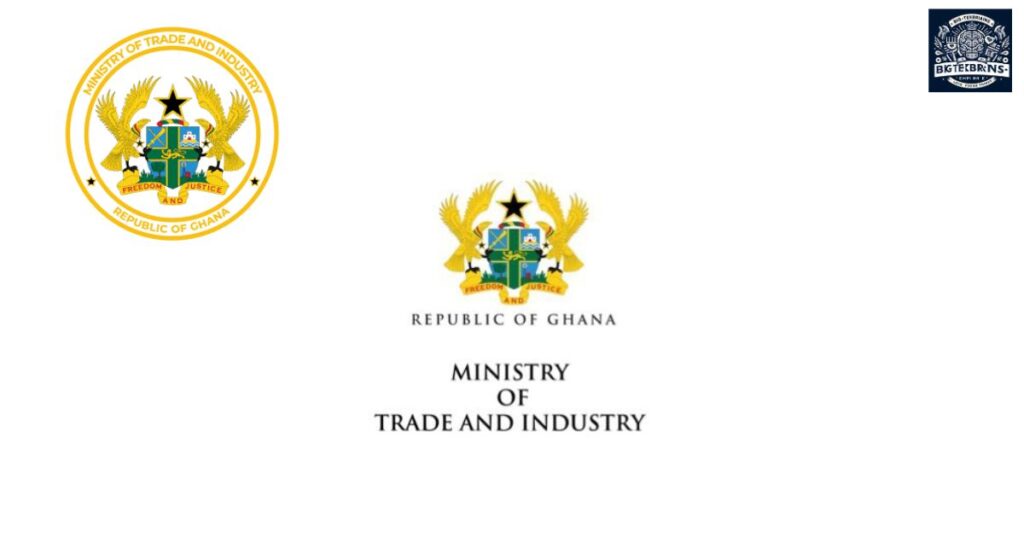Historical Overview
The Ministry of Trade and Industry (MoTI) in Ghana has its roots in the post-independence era, established to oversee the nation’s trade and industrial development. Key milestones include:
Colonial Era (Pre-1957):
- Trade policies were controlled by the colonial government to benefit British economic interests.
Post-Independence Period (1957-1966):
- Under Dr. Kwame Nkrumah, industrialization was a central focus with state-led initiatives to reduce dependence on imports.
Structural Adjustment Era (1980s-1990s):
- The ministry shifted its focus to liberalized trade policies under IMF and World Bank reforms.
Modern Era (2000s–present):
- Focus expanded to include fostering public-private partnerships, export promotion, and industrial transformation through initiatives like “One District, One Factory” (1D1F).
Operations
MoTI operates as a policymaking and regulatory body to drive Ghana’s trade, industry, and investment policies. Its key operations include:
Trade Promotion:
- Facilitating domestic and international trade.
Industrial Development:
- Implementing policies for industrial growth, such as agro-processing and value addition.
Investment Facilitation:
- Working with the Ghana Investment Promotion Centre (GIPC) to attract foreign investment.
Export Development:
- Supporting exporters through institutions like the Ghana Export Promotion Authority (GEPA).
Standards and Quality Assurance:
- Ensuring product standards through collaborations with the Ghana Standards Authority (GSA).
Constitutional Backing
The Ministry derives its mandate from:
1992 Constitution of Ghana:
- Articles 36(2)(b) and 36(4) outline the state’s responsibility to promote industrial development and regulate trade.
Legislative Instruments:
- Specific acts such as the GIPC Act (Act 865) and the Free Zones Act (Act 504) empower MoTI in its operations.
Offices and Institutions Under MoTI
Several offices and agencies operate under or collaborate with MoTI to achieve its objectives:
Ghana Export Promotion Authority (GEPA):
- Promotes non-traditional exports.
Ghana Standards Authority (GSA):
- Ensures product quality and conformity.
Ghana Free Zones Authority (GFZA):
- Oversees free zones for export-oriented businesses.
National Board for Small Scale Industries (NBSSI), now GEA:
- Supports small and medium enterprises.
Ghana International Trade Commission (GITC):
- Handles trade disputes and ensures fair trade practices.
Leadership
The Ministry is headed by a Minister of Trade and Industry, appointed by the President and approved by Parliament. Leadership roles include:
Minister:
- Provides strategic direction and oversees all activities.
Deputy Ministers:
- Assist the minister in specialized areas like industry or trade facilitation.
Chief Director:
- Heads the administrative functions of the ministry.
Method of Appointment
Ministers are appointed by the President of Ghana, subject to parliamentary approval, as per Article 78 of the 1992 Constitution.
Oversight and Collaboration
MoTI collaborates with and is overseen by several entities:
The Executive:
- Reports to the Presidency on policy implementation.
Parliament:
- Reviews policies, approves budgets and monitors performance.
International Bodies:
- Collaborates with WTO, ECOWAS, and UNIDO for trade and industrial programs.
Leadership (As of January 2025):
Offices and Institutions Working with MoTI
Ghana Revenue Authority (Customs Division):
- Facilitates trade by managing imports and exports.
Ghana Investment Promotion Centre (GIPC):
- Attracts foreign investment.
Association of Ghana Industries (AGI):
- Represents private sector industrial interests.
References:
- 1992 Constitution of Ghana – Articles 36, 78, and others.
- Ghana Ministry of Trade and Industry official website: www.moti.gov.gh.
- Ghana Export Promotion Authority (GEPA): www.gepaghana.org.
- Ghana Standards Authority (GSA): www.gsa.gov.gh.
- Books: “The Economy of Ghana: A Historical Perspective” by E.A. Boateng.

